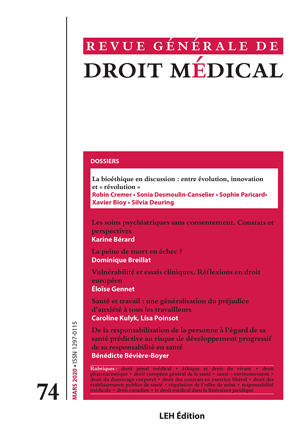Résumé
Le régime juridique des soins psychiatriques sans consentement est le fruit de la longue évolution de la collectivité à prendre en charge les personnes atteintes de troubles psychiques. À travers la loi du 5 juillet 2011 et la loi du 27 septembre 2013, le législateur a conservé le système médico-administratif qu’il a érigé au XIXe siècle. Néanmoins, il l’a atténué en introduisant un contrôle obligatoire du juge des libertés et de la détention et a élargi ces prises en charge aux soins ambulatoires. Ce système est caractérisé par une dualité des modalités d’admission : les soins à la demande du représentant de l’État d’une part, et les soins à la demande d’un tiers d’autre part, ces deux blocs étant eux-mêmes subdivisés en une pluralité de mesures, chacune justifiée pour des motifs divers. Les contentieux issus de ce régime juridique d’exception témoignent des nombreuses atteintes aux droits subies par les patients qui en font l’objet. Pour ces raisons, un toilettage de fond peut être envisagé. Il passerait par la fusion des deux blocs d’admission en un seul, par le prononcé des mesures par le juge et par un renforcement de la protection des droits et des libertés.
Mots-clés
Psychiatrie – Soins sans consentement – Soins . la demande d’un tiers – Soins à la demande du représentant de l’État – Juge des libertés et de la détention – Loi du 5 juillet 2011 – Loi du 27 septembre 2013
Abstract
The legal regime of the psychiatric care without consent, is the direct consequence of the long-term development of the society in managing the mentally disabled people. Through the law of 5 July 2011 and the law of 27 September 2013, the legislator maintained the model of care and medical administrative system without consent, dating from the nineteenth century. Nevertheless, the system has been attenuated by the introduction of a mandatory control of the liberty and custody judge and
expanded these medical cares at the ambulatory. This system is characterised by its own duality in terms of admission rules: the request for care on demand of the representative of State on the one hand, and of a third party on the other hand. Even if the legal regime for the medical care without consent is supposed to provide an appropriate care for each and every specific situations, often these policies are actually set for opportunistic reasons and do not always match reality. The disputes resulting from this exception legal regime demonstrate the many human rights violations suffered by the concerned patients. For these reasons, some tidying up can be envisaged. The latter would involve the merging of the two sets of procedures, the issuance of measures by the judge himself and a strengthening of the protection of civil rights and freedoms.
Keywords
Psychiatry – Care without consent – Care at the request of a third party – Care at the request of the representative of the State – Judge of liberties and detention – Law of 5 July 2011 – Law of 27 September 2013




